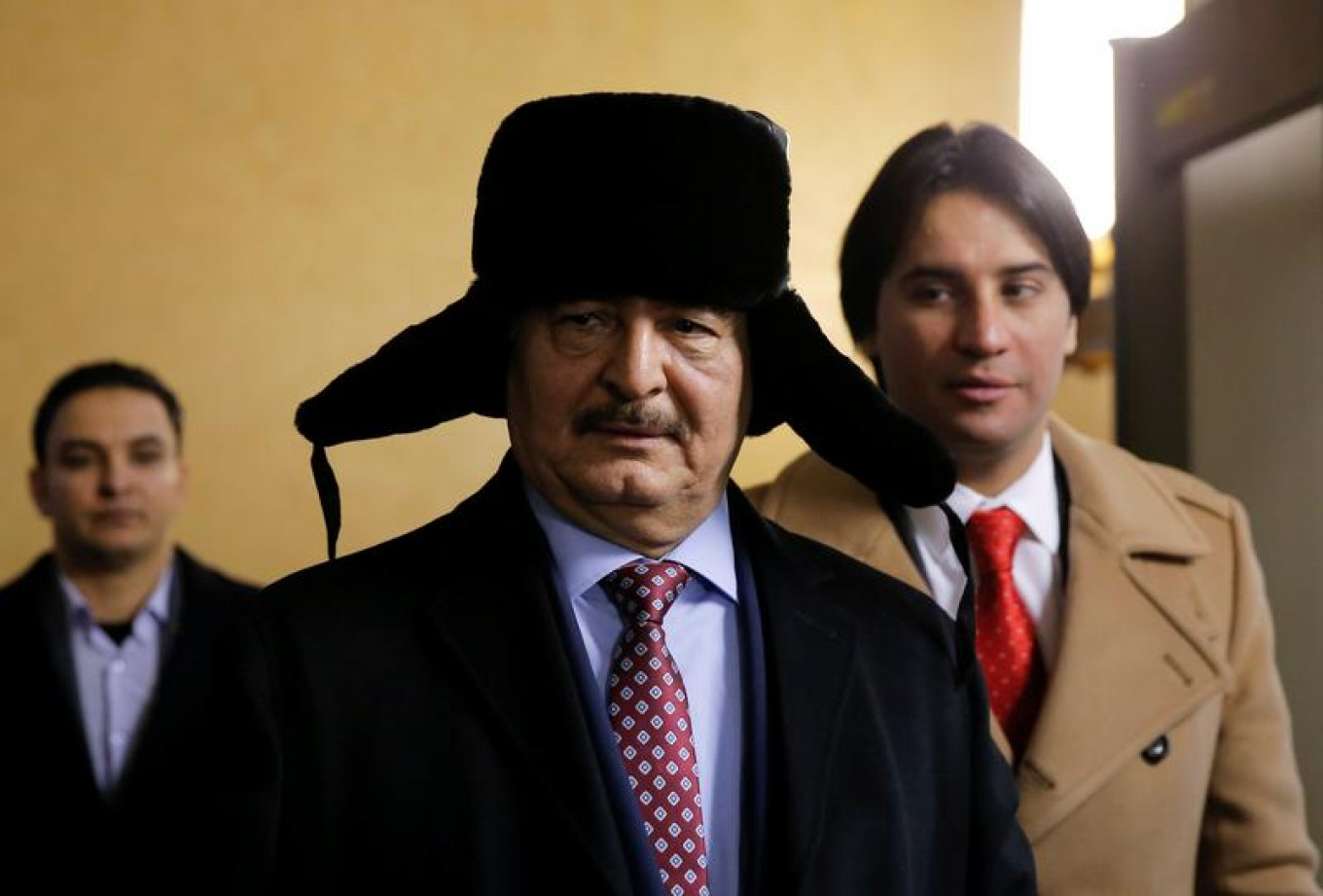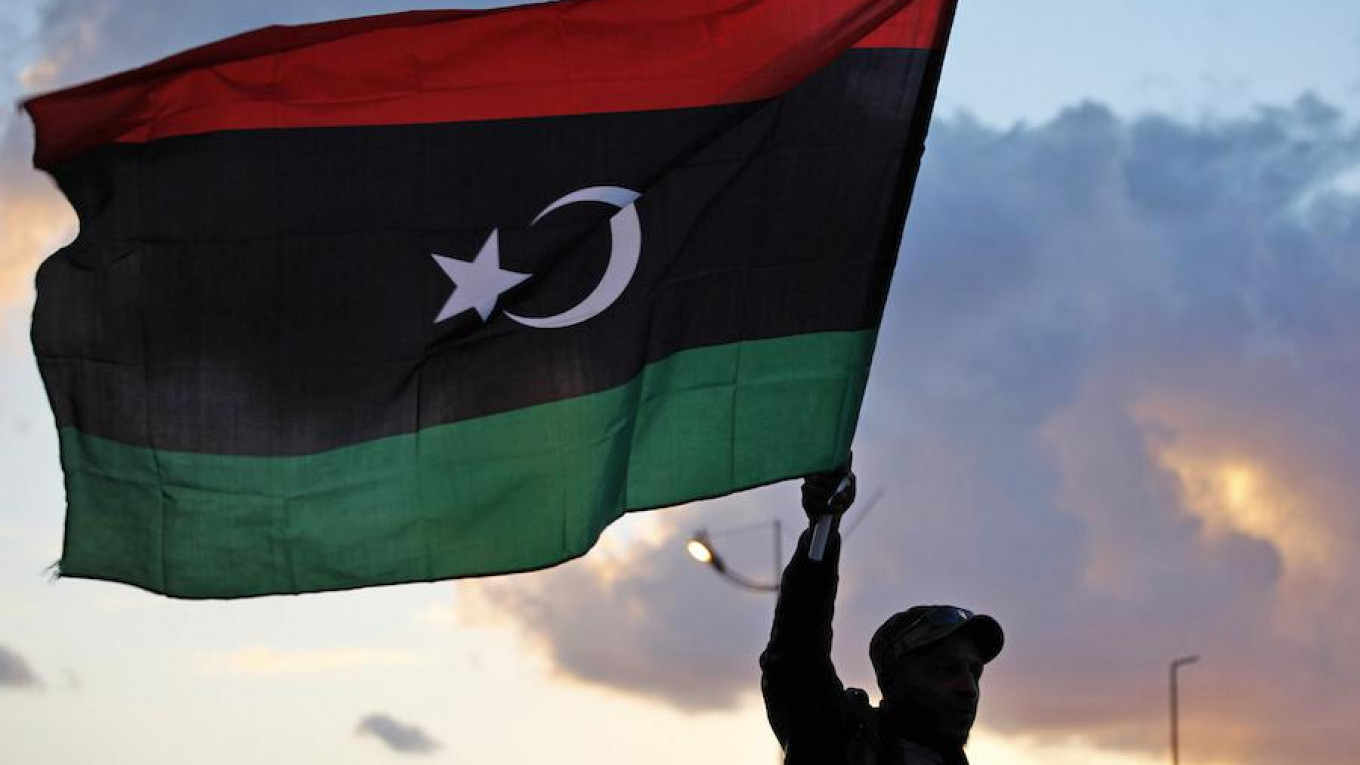Hours after Libya’s ambassador to Saudi Arabia, Abdel Baset al-Badri, wrapped up meetings with Russian government officials in Moscow on March 12, news broke that Russian special forces had been deployed to Egypt to prop up Kremlin-backed strongman Khalifa Haftar. Badri has been known as a proxy for Haftar abroad.
Russian politicians scrambled to dismiss the allegations. Vladimir Dzhabarov, First Deputy Chairperson of the Federation Council Committee on International Affairs, said “This is fake news, no attention should even be paid to it.”
“There are no Russian troops in Sidi-Barrani [in Egypt] at all,” Defense Ministry spokesperson Igor Konashenkov said. “This is not the first year that such bogus stories from anonymous sources have entertained the public.”
The news of Russia’s special forces deployment came just days after a Russian private security firm told the Reuters news agency that its contractors had been operating in Haftar-controlled territory in eastern Libya for months.
Amid the flurry of recent contact with Russia, Haftar’s forces launched an assault on key oil facilities on the Libyan coast. In short order, they claimed to have retaken the positions from Islamist militias. There is currently no hard evidence that Russian special forces soldiers took part in the operation.
“It’s too early to tell whether the Kremlin has decisively picked Haftar and his forces as its partner of choice in Libya,” says Ilan Berman, vice president of The American Foreign Policy Council, a Washington-based think tank. “What is clear, however, is that Haftar’s strategic advances have caught Moscow’s attention — and that Russia is willing to back them, at least for the moment.”
Fast Friends
Russia’s involvement with Haftar has been building up for some time. In November, the Libyan general traveled to Moscow to meet with Foreign Minister Sergei Lavrov. Not much was reported on the substance of their meeting, but Haftar allegedly asked for the Kremlin’s help in fighting radical Islamists — echoing rhetoric seen in Russia’s Syrian intervention.
Haftar himself has been making serious overtures to the Kremlin, says Berman. “He sees Russia as a potential kingmaker in his bid for control.”
Contact appeared to deepen in January, when a Russian naval battlegroup stopped on the coast of Libya on its return from a deployment in the eastern Mediterranean. Haftar was invited aboard the Russian navy’s flagship, the Admiral Kuznetsov, and given a personal tour. His visit concluded in a video conference with Defense Minister Sergei Shoigu in Moscow.
“Within Libya, there have been calls for Russian involvement,” says Maxim Suchkov, an expert in Russian policy in the region and an editor at Al-Monitor. “Moscow is seen as strong power-broker and deal-maker in the region following its intervention in Syria. That is a political resource Russia will certainly look to leverage.”

Oil
Russia’s political interests in Libya’s future are tightly linked to economic interests. And as part of a larger bid to reassert its Soviet-era influence over the wider Middle East and North Africa region, Russia’s state-owned oil giant has recently taken on a vital role.
Deals that Rosneft brokered with Libya’s National Oil Corporation (NOC) and the autonomous Kurdish government in northern Iraq last month are being touted — not so much for their economic importance — but for their political impact: they will inevitably vex rivals and gain leverage over the West’s allies in the region.
“Everything that has to do with North Africa and the Middle East is strategic [for the Kremlin],” Peter Kaznacheev, a London-based energy analyst said of the deals to The Moscow Times.
“By getting an inroad into Libya — through Khalifa Haftar or Libya’s NOC and oil production — Russia can make itself essential in Libya without having to get its hands dirty like in Syria.”
Haftar, who operates in eastern Libya, is opposed to the UN-backed Tripoli government. His troops initially wrested control of Libya’s Oil Crescent — a series of strategically important oil fields and refineries — from rebel factions in September but have struggled to maintain control over them.
President of the Institute of Energy Policy Vladimir Milov told The Moscow Times that oil and gas can act as a backbone to the political relationship that Russia is brokering with Libya. “Putin sees [Libya] as an opportunity to come in and offer some form of alternative partnership against Western influence which was not successful. Oil and gas relationships can embolden this geopolitical context.”
Arms Contracts
The other major economic player in Russia’s Libyan play is Rosoboronexport, the state arms export agency. The agency, which serves as a clearinghouse for Russian weapons on the foreign market, lost a major customer when Libyan dictator Muammar Gaddafi fell in 2011. Estimates generally range from $4 to $6 billion in lost contracts with the former Libyan government.
“The figure of $4 billion is only nominal,” says Russian arms export official Mikhail Dmitryev in 2011. “The real lost revenue could top tens of billions of dollars.”
Gaddafi had been purchasing arms from Moscow since 2008, when the two sides agreed to ease Libya’s debt burden to Russia. Gaddafi had committed to buying anti-aircraft systems, tanks, rocket artillery, fighter jets and one diesel-powered submarine. But his UN-backed successors in Tripoli have not shown interest in reaffirming those agreements.
Russia’s support for Haftar can be understood in similar terms, says Dr. Theodore Karasik, senior advisor at the Washington-based Gulf State Analytics.
“Russia is seeking to bury itself deep into Libya's future. It is highly likely that outstanding Gaddafi-era debt will be written off through concessions,” he says. “The Kremlin will likely forgive this debt much like they forgave Syria’s. Concessions will likely be in energy and in arms supplies.”
The UN-backed government in Tripoli is apparently aware of Russia's interests in the outstanding arms contract payments.
Syria Repeat
As Russia’s role in Libya expands, officials in Washington are beginning to take notice. During his testimony to Congress on March 9, U.S. Marine General Thomas D. Waldhauser said: “Russia is trying to exert influence on the ultimate decision of who becomes and what entity becomes in charge of the government inside Libya.”
“They [Moscow] are working to influence that decision."
Senator Lindsey Graham, one of the more hawkish Republicans on the Hill, asked General Waldhauser about Russia’s strategy in the region - and specifically if the Kremlin was attempting to recreate the success of its Syrian campaign. There, Russia provided material support to Bashar Assad to stabilize his regime — thus ensuring Moscow had a say in Syria’s future.
Waldhauser’s answer was straightforward: "Yes, that's a good way to characterize it."
A Message from The Moscow Times:
Dear readers,
We are facing unprecedented challenges. Russia's Prosecutor General's Office has designated The Moscow Times as an "undesirable" organization, criminalizing our work and putting our staff at risk of prosecution. This follows our earlier unjust labeling as a "foreign agent."
These actions are direct attempts to silence independent journalism in Russia. The authorities claim our work "discredits the decisions of the Russian leadership." We see things differently: we strive to provide accurate, unbiased reporting on Russia.
We, the journalists of The Moscow Times, refuse to be silenced. But to continue our work, we need your help.
Your support, no matter how small, makes a world of difference. If you can, please support us monthly starting from just $2. It's quick to set up, and every contribution makes a significant impact.
By supporting The Moscow Times, you're defending open, independent journalism in the face of repression. Thank you for standing with us.
Remind me later.






